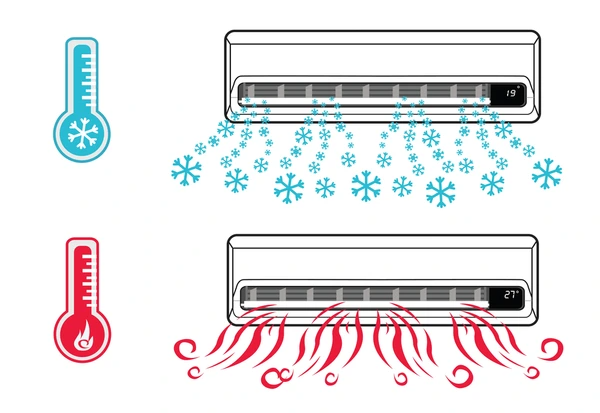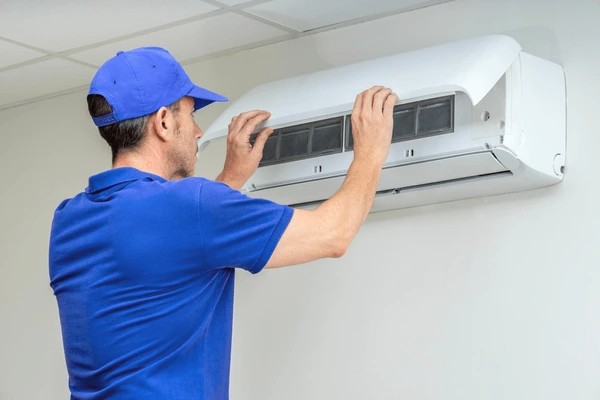
When buying an air conditioner, one of the most important decisions is whether to go with an inverter or non-inverter model. Both types can cool your room effectively, but they differ greatly in how they operate, how much electricity they consume, and how they affect long-term comfort and cost.
This article compares inverter and non-inverter air conditioners based on their power consumption, cooling performance, operating costs, and ideal use cases—so you can make the best choice for your home or office.
Inverter vs. Non-Inverter AC – Which performs better? Eureka Technical Q&A compares their power consumption and cooling efficiency, helping you understand why inverter ACs offer better energy savings and consistent performance over time.
How Inverter and Non-Inverter ACs Work
Non-Inverter ACs
Operate with fixed-speed compressors using electromechanical relays to cycle between 100% load (ON) and 0% load (OFF). This creates:
- High inrush currents during compressor startup (~6× rated current ), increasing energy waste and wear.
- Temperature fluctuations (±2–3°C) due to ON/OFF cycling, reducing comfort .
- Lower SEER/ISEER ratings (typically 2.5–3.5) compared to inverter models .
Inverter ACs
Use variable-frequency drives (VFDs) with insulated-gate bipolar transistors (IGBTs) to modulate compressor speed (10–100% capacity). Key mechanisms include:
- DC link voltage regulation (e.g., 300–400 VDC) via PWM-controlled rectifiers .
- Real-time load matching by adjusting frequency (e.g., 15–150 Hz) based on thermal sensors .
- Reduced harmonic distortion (<5% THD) through active power factor correction .
Power Consumption Comparison

Energy Efficiency and Performance
Inverter ACs offer better energy efficiency. They adjust compressor speed based on room temperature and cooling demand.
This variable speed prevents the frequent on-and-off cycling seen in non-inverter ACs. As a result, inverter models consume less power.
Consistent Temperature Control
Inverter ACs maintain a steady room temperature by running continuously at a lower power level. This boosts comfort and efficiency.
Non-inverter ACs switch off when reaching the desired temperature and restart when it rises. This creates fluctuations and wastes more energy.
Operational Noise and Wear
Inverter units run more quietly because they avoid frequent starts and stops. This also reduces wear on components over time.
Non-inverter models can be noisier and experience more mechanical stress due to constant cycling.
Conclusion
Inverter ACs provide consistent cooling, lower energy bills, and quieter operation. Non-inverter ACs cost less upfront but run less efficiently.
| Parameter | Inverter AC | Non-Inverter AC |
|---|---|---|
| Energy Efficiency | 44% lower consumption | Higher peak demand |
| Temperature Stability | ±0.5°C variance | ±2.5°C variance |
| Noise Level | 38–45 dB(A) | 48–55 dB(A) |
| Compressor Lifespan | 12–15 years | 8–10 years |
Inverter ACs consume less energy overall, especially in regions with long summers or when the unit is used for many hours a day.
Cooling Performance
Inverter AC
- Provides faster cooling during startup
- Maintains stable temperature with minimal fluctuation
- Operates more quietly due to smoother speed transitions
- Adapts better to room load and occupancy
Non-Inverter AC
- Slower temperature response at start
- Room temperature may swing as the compressor cycles on and off
- Typically noisier due to frequent startup noise
- Less effective at dealing with varying room heat loads
Durability and Maintenance
- Inverter ACs usually have longer lifespans due to smoother operation, although repairs can be more expensive.
- Non-inverter ACs have simpler mechanics and lower upfront maintenance costs but may wear out faster due to repeated stress from cycling.

Cost Comparison
- Inverter ACs are designed to be more energy-efficient, which can translate to lower electricity bills over time. Studies have shown that inverter ACs can consume up to 30-40% less electricity than non-inverter models, leading to significant cost savings on energy bills.
- Non-inverter ACs, while often less expensive to purchase, may result in higher long-term energy costs due to their lower efficiency. However, they can be a viable option for budget-conscious consumers who prioritize upfront costs over ongoing energy savings.
| Cost Factor | Inverter AC | Non-Inverter AC |
|---|---|---|
| Purchase Price | Higher upfront cost | Lower upfront cost |
| Energy Savings | High over time | Low |
| Payback Period | 2–3 years (average usage) | No significant long-term savings |
| Total Cost of Ownership | Lower in the long run | Higher due to power bills |
If you’re willing to invest more initially, inverter ACs typically pay for themselves through energy savings within a few years.
Ideal Use Cases
- Inverter AC: Best for areas with long hot seasons, people who use air conditioning for many hours daily, or those seeking quiet and stable cooling.
- Non-Inverter AC: Suitable for budget-conscious buyers who need occasional cooling in smaller rooms or cooler climates.
FAQs About Inverter vs. Non-Inverter AC
Does an inverter AC cool faster than a non-inverter?
Yes. It runs at maximum power during startup, cooling the room faster than a non-inverter model.
Can inverter ACs run on solar power?
Yes. Their efficient energy use makes them more compatible with solar systems.
Is the maintenance cost higher for inverter ACs?
Repairs can be more expensive due to complex components, but routine maintenance is similar for both types.
Do inverter ACs work well in small rooms?
Yes. They adjust power based on room size and load, making them efficient in both small and large spaces.
Which is more environmentally friendly?
Inverter ACs use less electricity and produce fewer emissions, making them the greener choice.
Conclusion
The choice between an inverter and non-inverter air conditioner comes down to usage patterns, budget, and efficiency needs. Inverter ACs offer better long-term performance, energy savings, and comfort, while non-inverter models provide basic cooling at a lower upfront cost. For daily use and long-term reliability, an inverter AC is often the smarter investment.
To get detailed scientific explanations of Inverter vs. Non Inverter AC, try Patsnap Eureka.


